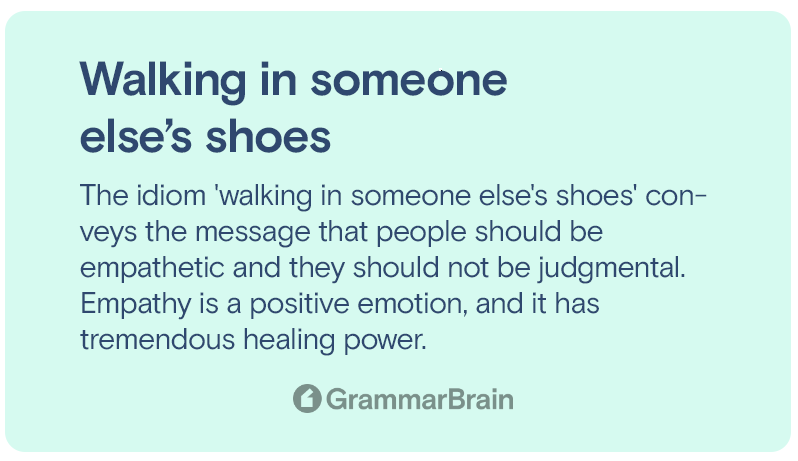What does it mean to be walking in someone else’s shoes? The English language is a dominant language around the globe. We use the English language in every field, so it is important to understand its proper use and vocabulary. English is a beautiful language with an excellent vocabulary. It will be interesting to know and learn the words and use them in your day to day life.
Let us discuss this popular idiom used in the English language.

Meaning of the idiom ‘Walking in someone else’s shoes’
It is easy to blame or pass a comment on someone. Walking in someone else’s shoes means before judging a person and his deeds, we must understand his situations, thought processes, experiences, and challenges he faced. You will have to change your opinion once you understand that person and the reason behind his/her actions.
This idiom has a strong connection with human behavior. The idiom ‘walking in someone else’s shoes’ conveys the message that people should be empathetic and they should not be judgmental. Empathy is a positive emotion, and it has tremendous healing power.
Being empathetic means feeling life and situations from the other person’s perspective. This practice will help to develop a harmonious relationship and keep your mind at ease.
What is an idiom?
An idiom is a group of words that conveys a specific meaning. The English language has a lot of expressions that can be used ironically.
‘Walking in someone else’s shoes is a popular idiom which is used commonly in the English language. We use this idiom when we compare someone’s life experience with ours. We use this idiom to emphasize someone’s perspective, experience, etc.
Origin of the idiom ‘Walking in someone else’s shoes’
The idiom ‘Walking in someone else’s shoes originated from a poem by Mary .T. Lathrop. The poem was published in 1895. The title of the poem was ‘Judge Softly’. This title was changed later to ‘Walk a mile in someone else’s moccasins’. Moccasins are shoes made of soft leather.
Similar idioms
There are various idioms in use that convey the same meaning. Here is the list of similar idioms.
- Walk a mile in someone’s shoes
- Put oneself in another’s shoes
- Put yourself in someone’s shoes
- Walk a mile in my shoes
- Put yourself in somebody’s shoes
- See the world through someone else’s eye
Examples of sentences using similar idioms
- You need to walk a mile in her shoes to understand her situation.
- Put yourself in his shoes first before you make such heartless comments.
- It is easy to judge people before walking in their shoes.
- Try to see the world through his eyes, then you will understand the meaning of his actions.
- You will not understand the pain until you experience the same. It is like walking in someone else’s shoes.
- If you can, try to walk in my shoes. Show some empathy, then you will understand.
- Before you blame my kids and me, walk in my shoes and try to understand the situation.
- Walking in someone else’s shoes before judging them shows maturity.
- Empathy means walking in someone else’s shoes.
- First you walk a mile in their shoes and then believe.
Synonyms that convey similar meanings
- Feel for
- Connect with
- Put in the same category
- Relate to
- Think of it in connection
- Understand
- Associate
Conclusion
From the above details, we can understand the meaning of the idiom ‘walking in someone else’s shoes’ and the context in which this idiom is being used. This idiom is commonly used in conversations and even in literary quotes. Such idioms are the proofs that show how languages can be ironic and can explain in-depth meanings.
Inside this article
Fact checked:
Content is rigorously reviewed by a team of qualified and experienced fact checkers. Fact checkers review articles for factual accuracy, relevance, and timeliness. Learn more.
Core lessons
Glossary
- Abstract Noun
- Accusative Case
- Anecdote
- Antonym
- Active Sentence
- Adverb
- Adjective
- Allegory
- Alliteration
- Adjective Clause
- Adjective Phrase
- Ampersand
- Anastrophe
- Adverbial Clause
- Appositive Phrase
- Clause
- Compound Adjective
- Complex Sentence
- Compound Words
- Compound Predicate
- Common Noun
- Comparative Adjective
- Comparative and Superlative
- Compound Noun
- Compound Subject
- Compound Sentence
- Copular Verb
- Collective Noun
- Colloquialism
- Conciseness
- Consonance
- Conditional
- Concrete Noun
- Conjunction
- Conjugation
- Conditional Sentence
- Comma Splice
- Correlative Conjunction
- Coordinating Conjunction
- Coordinate Adjective
- Cumulative Adjective
- Dative Case
- Determiner
- Declarative Sentence
- Declarative Statement
- Direct Object Pronoun
- Direct Object
- Diction
- Diphthong
- Dangling Modifier
- Demonstrative Pronoun
- Demonstrative Adjective
- Direct Characterization
- Definite Article
- Doublespeak
- False Dilemma Fallacy
- Future Perfect Progressive
- Future Simple
- Future Perfect Continuous
- Future Perfect
- First Conditional
- Irregular Adjective
- Irregular Verb
- Imperative Sentence
- Indefinite Article
- Intransitive Verb
- Introductory Phrase
- Indefinite Pronoun
- Indirect Characterization
- Interrogative Sentence
- Intensive Pronoun
- Inanimate Object
- Indefinite Tense
- Infinitive Phrase
- Interjection
- Intensifier
- Infinitive
- Indicative Mood
- Participle
- Parallelism
- Prepositional Phrase
- Past Simple Tense
- Past Continuous Tense
- Past Perfect Tense
- Past Progressive Tense
- Present Simple Tense
- Present Perfect Tense
- Personal Pronoun
- Personification
- Persuasive Writing
- Parallel Structure
- Phrasal Verb
- Predicate Adjective
- Predicate Nominative
- Phonetic Language
- Plural Noun
- Punctuation
- Punctuation Marks
- Preposition
- Preposition of Place
- Parts of Speech
- Possessive Adjective
- Possessive Determiner
- Possessive Case
- Possessive Noun
- Proper Adjective
- Proper Noun
- Present Participle
- Prefix
- Predicate



